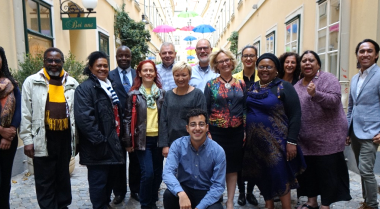
Webinar: Tools for Conflict Analysis, The Onion and Conflict Mapping
23 October 2019, Starting at 12.00 CET (register here)
Experienced trainers Tatjana Popovic and Elvir Đuliman from Western Balkans, will present how they use Conflict Analysis Tools during their capacity-building trainings on conflict for multi-ethnic groups in the region. They will address some of the questions: Why is it important to define and understand the attitudes, behaviour and context of all sides involved in a conflict? Who are the parties to the conflict actually? What are the drivers of conflict and how to identify stakeholders of peace? In what way are teams preparing for negotiation and mediation processes and how to they use these analysis?
This is the third webinar in our Improving Practice Webinar series.
Who can participate? Anyone interested in peace education can join us for these webinars. Register to join!
What language will the webinar be delivered in? In English.
What technology do I need to be able to view the webinar? We will be using Zoom for the webinar.
How do I register to the webinar? To view the webinar, you must first register here
Date & time: 23 October 2019, Starting at 12.00 CET
About Tatjana Popović
Tatjana holds MA in Peace Studies from the Faculty of Political Sciences, University of Belgrade and
is a certified mediator. She is a director of Nansen Dialogue Centre Serbia and an experienced trainer within conflict transformation field. She facilitated, over the last 18 years, a number of inter-ethnic dialogue seminars for teachers, ministries of education advisors and local authorities’ representatives in the Western Balkans, thus contributing to cross-border cooperation and reconciliation. Focus of her trainings is on Dialogue and Communication, Interactive Teaching Methodologies and Team work; Conflict Analysis Tools, Negotiation and Peace Mediation. Facilitating trainings for trainers with international groups (representaitves of NGOs, RIGOs, INGOs, universities), in the UK, Norway, Russia, Georgia and in Turkey enriched her experience significantly. Her skills include creating programmes, planning long-term PB strategies and drafting policy papers. In Serbia, she is coordinating implementation of School mediation in multicultural communities programme. School mediation as a conflict prevention and resolution mechanism is being implemented through school mediation clubs in multi-ethnic schools in South Serbia and in Vojvodina. Tatjana is the author of several practice books on Dialogue and Education for Peace.
About Elvir Duliman
With a background in economy and applied conflict transformation, Elvir joined the Nansen Dialogue Centre Mostar (Bosnia Herzegovina) in 2000. The organisation was founded the same year to promote dialogue among different ethnic, religious, political and interest groups with the aim of preventing and resolving conflicts. Elvir has been leading Nansen Dialogue Centre Mostar (NDC) since 2007. In recent years, together with his team, he focused on designing, promoting and successfully implementing integrated education activities and trainings in a number of municipalities affected by the “two schools under one roof” system. With its hands-on experience of working with local stakeholders through longer-term projects, NDC has successfully built acceptance and trust among local communities, and become one of the leading non-government organisations in the field of interethnic dialogue and integrated education in the Herzegovina region.
